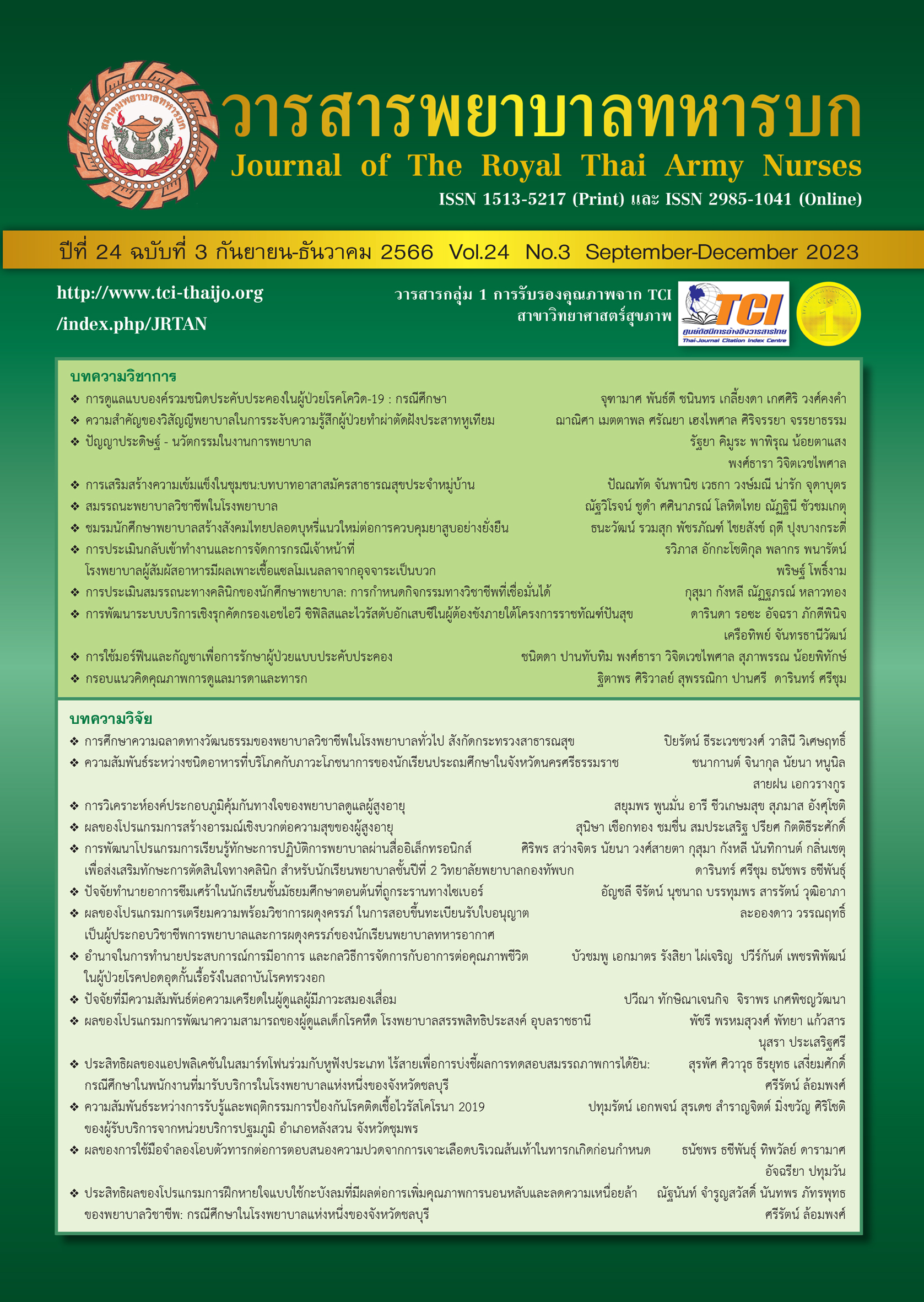A Study of Cultural Intelligence of Registered Nurses in General Hospitals under The Ministry of Public Health
Keywords:
cultural intelligence, nurseAbstract
The purpose of this descriptive research was to study the cultural intelligence of registered nurses in general hospitals under the Ministry of Public Health and compare the cultural intelligence of registered nurses classified by age, education level, work experience, number of foreign patients, level of supervision and cross-cultural nursing training. The sample was 382 registered nurses selected by multi-stage sampling technique. The findings can be summarized as follows: 1) The overall cultural intelligence of registered nurses in general hospitals under the Ministry of Public Health were found to be high ( = 5.27, SD = 0.77). In terms of individual dimensions, the behavioral dimension was found to have the highest level (
= 5.45, SD = 0.77), followed by the metacognitive (
= 5.42, SD = 0.77), and motivational dimensions (
= 5.18, SD = 0.85), while the cognitive dimension had the lowest mean score (
= 5.02, SD = 0.95). 2) Registered nurses with different numbers of foreign patients, levels of supervision, and cross-cultural nursing training perceived their cultural intelligence levels differently with statistical significance at .05, while registered nurses with different ages, work experience and educational levels perceived their cultural intelligence levels no differently.
Downloads
References
Van Dyne L, Ang S, Ng KY, Rockstuhl T, Tan ML, Koh C. Sub-dimensions of the four-factor model of cultural intelligence: Expanding the conceptualization and measurement of cultural intelligence. Social and personality psychology compass. 2012; 6(4): 295-313.
Health administration divisions. Health status in 2020. Nonthaburi: Ministry of Public Health; 2020. (in Thai)
Artsanthia J and Chaleoykitti S. Transcultural nursing in ASEAN Community. Journal of The Royal Thai Army Nurses. 2016; 17(1): 10-16. (in Thai)
Sriphan S, Choodam S. A development of an instructional model Emphasizing cultural competency of nursing students for antenatal care in three southern border provinces of thailand. Nursing Journal of The Ministry of Public Health. 2015; 25(1): 54-69. (in Thai)
Kaewthongprakham P. Competency of community nurses on maternal and child health in 3 southern border provinces, Pattani, Yala, Narathiwat. The project to develop the potential of community nurses in the 12th to enhance the potential of the regional first aid system Ministry of Health. 2017. (in Thai)
Songwatthana P. Nursing research across cultures: Research concepts and issues. Thai Journal of Nursing Council. 2014; 29(4): 5-21. (in Thai)
Julawong O. Transcultural care and AEC era. Journal of the Royal Thai Army Nurses. 2014; 15(1): 1-6. (in Thai)
Flora R, Rashin M. Cultural intelligence and its health service area relation with professional competency in nurses. Nursing Practice Today. 2017; 4(3). 115-24.
Engle RL, Nehrt CC. Antecedents of cultural intelligence: The role of risk, control, and openness in France and the United States. Journal of Management Policy and Practice. 2012; 13(5): 35-47.
Baez D. Cultural intelligence in foreign language classes. (Unpublished doctoral dissertation). Indiana: Indiana State University; 2013.
Reichard RJ, Dollwet M, Louw-Potgieter J. Development of cross-cultural psychological capital and its relationship with cultural intelligence and ethnocentrism. Journal of Leadership & Organizational Studies. 2014; 21(2): 150-64.
Balli E. Cultural intelligence: It’s relation with demographic variables and career decision of students. In: O. Nejat Akfırat DDS, Gürkan Yavaş, editor. Current debates in education. first ed: IJOPEC Publication Limited; 2017. 41-61.
Bahaadini F, Rashidinejad M, Jahani Y, Eghbali T, Azizzadeh Forouzi M. Cultural intelligence in nurses: relationship with social interaction. Iranian Journal of Culture and Health Promotion. 2021; 5(2): 228-36.
Mahmoodeh N. The Moderating effect of cultural intelligence on the relationship of transformational and transaction leadership styles and job performance (dissertation): Universiti Teknologi Malaysia; 2017
Phanphairoj K, Loa R, Yoong, T. L., Chumwichan S. The scale of cultural intelligence of nursing students: Testing measurement invariance among Malaysia, the Philippines, and Thailand. Journal of Research Methodology. 2019; 32(3): 321-40. (in Thai)
Yamane T. Statistics: An introductory analysis. 3ed. New York: Harper and Row.1973.
Pongthong W. A study of professional nurses’ autonomy in hospitals and medical centers, Ministry of Public Health. (thesis). Bangkok: Chulalongkorn University, 2014. (in Thai)
Changpean A, Abhicharttibutra K, Thungjaroenkul P. Personality Traits and Work Role Performance of Nurses in Regional Hospitals. Journal of Health and Nursing Research 2020; 36(3): 192-203. (in Thai)
Chonjaroen H. Factors related to transcultural nursing competence of nurse practitioners working with Muslim people. (thesis). Bangkok: Thammasat University, 2016. (in Thai)
Rienrungrote S. Emergency nurses’ cultural diversity nursing practice in Southern Thailand and its related factors. (thesis). Songkhla: Prince of Songkhla University, 2016. (in Thai)
Naikhon B, Kachachat U. The relationship between the supervision of the head nurse Organizational atmosphere and working ability of professional nurses in Chaophya Abhaibhubejhr Hospital. Journal of Nursing Division. 2015; 37(1): 28-38. (in Thai)
Smithikrai C. Personnel training in organization. 8ed. Bangkok: Chulalongkorn University Press. 2015. (in Thai)
Downloads
Published
How to Cite
Issue
Section
License
Copyright (c) 2023 Journal of The Royal Thai Army Nurses

This work is licensed under a Creative Commons Attribution-NonCommercial-NoDerivatives 4.0 International License.
บทความหรือข้อคิดเห็นใดใดที่ปรากฏในวารสารพยาบาลทหารบกเป็นวรรณกรรมของผู้เขียน ซึ่งบรรณาธิการหรือสมาคมพยาบาลทหารบก ไม่จำเป็นต้องเห็นด้วย
บทความที่ได้รับการตีพิมพ์เป็นลิขสิทธิ์ของวารสารพยาบาลทหารบก
The ideas and opinions expressed in the Journal of The Royal Thai Army Nurses are those of the authors and not necessarily those
of the editor or Royal Thai Army Nurses Association.






